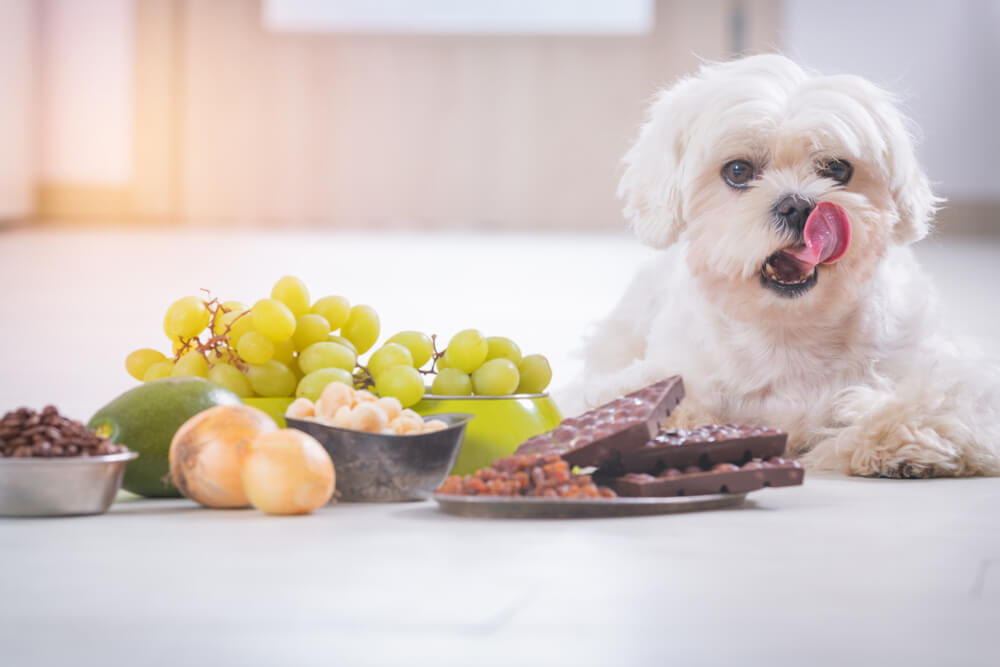
DogFoodAdvisor is reader supported See how
Dog Food Advisor is 100% impartial and is never paid to promote any brand. But if you buy using links on this page, we may earn a referral fee.
What might be a tasty human snack, could be a deadly food for dogs. While many pet parents are aware chocolate, alcohol, and caffeine aren’t suitable for dogs, there are a few lesser-known human foods that are off-limits and may even be fatal if ingested.
As a pet parent, it can be tricky to keep tabs on what your dog sneaks into their mouth and it can be difficult to resist those beady eyes. However, understanding what food is harmful to dogs means you can take extra caution to keep them out of reach.
What Foods Are Toxic To Dogs
Feeding your dog fatty foods and other human snacks that are bad for them is definitely not advised. However, a pet parent needs to recognize the following toxic foods for dogs to keep them out of reach or take immediate action if ingested.
Alcoholic beverages
All three main types of alcohol—ethanol, methanol, and isopropanol—are poisonous to dogs. They can’t metabolite alcohol the way a human body can. If untreated, alcohol poisoning in dogs can cause organ failure and death. The kidneys and lungs attempt to eliminate toxins, but excessive alcohol can overwhelm these systems and lead to toxicity. If your dog has drunk any amount of alcohol, take them to the vet immediately.
Chocolate
Chocolate contains an ingredient called theobromine. Humans can metabolize theobromine naturally, but dogs cannot. Dark chocolate and cocoa have the highest levels of theobromine when cooking. Milk and white chocolate have the lowest levels of theobromine. It takes less than one ounce of dark chocolate to poison a 19kg dog. Therefore, if you think that your dog has eaten even a tiny amount of chocolate, seek veterinary help immediately.
Caffeine
Dogs are much more sensitive to caffeine than humans are. Caffeine raises blood pressure and causes cardiac arrhythmias, which can be dangerous. Dogs may also lose muscle control and have tremors or seizures. As well as this, caffeine affects the gastrointestinal tract and can cause vomiting and diarrhea. A small sip from your tea is unlikely to cause harm, but excessive doses of caffeine can lead to dangerous symptoms.
Grapes and Raisins Family
Grapes, raisins, sultanas, and currants are all potentially poisonous to dogs. If eaten they can cause gut problems and in serious cases, kidney failure. The toxic dose varies, but, it can only take a small amount to cause harm.
Macadamia Nuts
Never feed any quantity of macadamia nuts to your dog – even small quantities are toxic. Macadamia nut ingestion by dogs can lead to a syndrome characterized by muscle weakness, CNS depression, vomiting, and hyperthermia.
Mushrooms
Many mushrooms contain health benefits and are a key component of specialty treatments for cancers and other conditions. There are also a huge number of mushrooms, however, that are highly toxic. For this reason, never let your dog eat wild mushrooms when out walking. Don’t feed them mushrooms that are unidentified and or not 100% known as safe.
The Onion Family
Do not feed any onions, whether raw or cooked — even small amounts of onion in foods can be dangerous for dogs. This applies to the entire allium family, which includes shallots, leeks, chives, and garlic. These foods contain a toxic principle known as N-propyl disulfide. This compound causes a breakdown of red blood cells, leading to anemia in dogs.
Sugar-Free Foods
Sugar-free products such as chewing gum contain artificial sweeteners, like xylitol. Eating xylitol-containing products can cause a fall in blood sugar levels and even collapse or death.
Keep any sugar-free foods out of reach from your dog and ensure any peanut butter you use for your dog has no added artificial sweeteners.
Foods Containing Toxic Ingredients
Don’t forget to avoid foods with toxic ingredients. For example, mince pies, fruit cakes, chocolate biscuits, stuffing, etc., all contain harmful foods for dogs that you might forget about.
What Foods Are Bad For Dogs
Certain human foods aren’t necessarily toxic but are choking hazards, can cause splintering, or contain too much fat. Here are a list of foods to be cautious of with your dog:
Fatty trimmings
Feeding your dog table scraps that contain a high amount of fat such as the fatty part of bacon or other meat cuts can be harmful for your dog. This type of fat doesn’t provide the benefits that healthier fats do. If your dog consumes a lot of fatty trimmings, they may feel unwell and it can lead to obesity or pancreatitis.
Fruit Pits/Seeds
Fruit pits or seeds can release compounds that form toxic substances when digested but can also form an obstruction in the digestive system. If you’re giving your dog an apple or a peach, make sure to remove the core or avoid the fruit entirely if you’re unsure.
Cooked Bones
When cooked, bones become brittle and easily shattered. These pieces can cause serious damage to the dog’s mouth, throat, or intestines.
Yeast dough
Raw, uncooked yeast ferments the carbohydrates in the dough, producing ethanol and carbon dioxide. This process can continue in the stomach, leading your dog to become bloated and disorientated. This can also happen with certain breads, sourdough, for example, can expand in your dog’s stomach and cause bloating, pain, and vomiting.
What Food Can Kill Dogs?
If a dog ingests any of the toxic foods above, it could potentially kill them. Sometimes your dog will show symptoms such as vomiting or disorientation immediately but it can also take a few days for such signs to appear. That’s why it’s important to take your dog to the vet immediately if they have eaten something dangerous. It’s possible to recover from toxicity but it largely depends on how much was consumed and the type of dog.
What Fruits Can Dogs Not Eat
Most fruits are safe for your dog to eat in small quantities. However, pet parents need to be careful of stones, seeds, pits, leaves, and cobs as they can cause problems for dogs.
Fruits such as plums, peaches, cherries, and mangos are OK for dogs but the stones aren’t safe. Remove the middle or cut off a small slice if you wish to give your dog a taste. Other fruits such as apples, pears, and tomatoes are also ok if you remove the seeds and the core.
Avocados aren’t highly toxic to dogs, but the leaves, bark, and skin can lead to vomiting or indigestion as they contain a natural antifungal compound called persin. Avocado is also high in fat so only a little bit of the fruit is recommended and of course, guacamole is a no-no due to the extra ingredients.
Grapes and raisins, as mentioned, should be avoided as they are toxic and cause liver issues but generally, a small piece of fruit is fine for your dog.
Final word
The Dog Food Advisor does not accept money, gifts, samples or other incentives in exchange for special consideration in preparing our reviews.
However, we do receive a referral fee from online retailers (like Chewy or Amazon) and from sellers of perishable pet food when readers click over to their websites from ours. This helps cover the cost of operation of our free blog. Thanks for your support.
For more information, please visit our Disclaimer and Disclosure page.
Article reviewed by
Laura Ward
Pet Nutritionist
Laura studied BSc (Hons) Animal Science with an accreditation in Nutrition at the University of Nottingham, before working for eight years in the pet food and nutrition industry.




